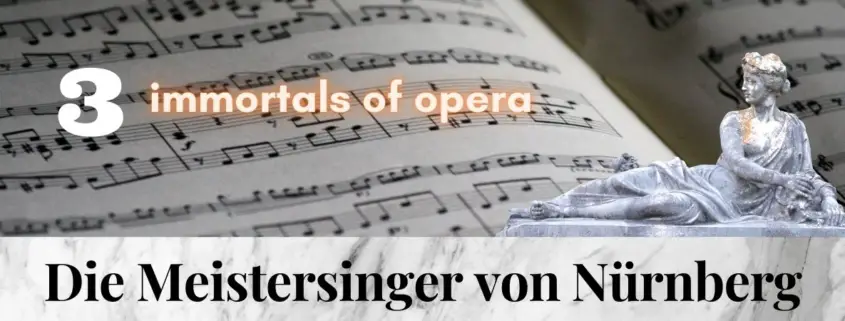The Meistersinger are perhaps Wagner’s greatest stroke of genius. The musical themes are dazzling, the orchestration and compositional technique is masterful, the plot is originally designed, and with Hans Sachs, Wagner has created a unique role-portrait.
The radiant prelude
The magnificent prelude has become one of Wagner’s most famous concert pieces. Wagner introduces some of his wonderful leitmotifs and lets them shine polyphonically in the orchestral parts. We get to know five of the most important leitmotifs of the opera. At the beginning we hear the Meistersinger motif in radiant C major, which portrays the dignity and sublimity of the masters:
Next, Walther’s urgent love motif is heard, with the falling fourths (which will reappear in the Beckmesser caricature):
Shortly afterwards, the Meistersinger March appears, a fanfare-like theme that Wagner took from a historical Meistersinger songbook
And immediately after that we hear the guild motif:
After a longer transition we hear the tender and expressive Passion motif, which later becomes part of the price song.
Vorspiel
The great quintet
This intimate quintet is one of the absolute highlights of this opera and has a unique status in Wagner’s entire oeuvre. It is reminiscent of Beethoven’s quartet from Fidelio and is a skilful, magnificent resting place of this opera before the grand ceremony on the fairground. It begins with a solemn introduction by Hans Sachs accompanied by the most beautiful chords of the orchestra.
We hear a recording with the heavenly Eva of Elisabeth Grümmer.
Selig wie die Sonne – Schöffler / Alsen / Kunz / Seefried / Dermota
Walther’s prize song
Walther begins his song. Already after the first verse a murmur of astonishment goes through the audience and the mastersingers, which increases after the second verse. After the third verse there is no longer any doubt about the winner. Eva crowns the winner and Pogner solemnly accepts Walther into the guild of masters. But the latter rejects the consecration, shocked, Eve collapses.
Walther’s prize song consists of three verses that are continuously increased in tempo, volume and intensity. It is an urgent and romantic heroic tenor aria, which must be sung in the most beautiful legato and which receives its beauty not least through the magnificent accompaniment.
We hear in this effective piece Placido Domingo. The Spanish-speaking tenor was not the ideal Walther from an idiomatic point of view, but no tenor could match the beauty and splendor of his interpretation of the prize song.
Morgenlich leuchtend im rosigen Schein – Domingo












Leave a Reply
Want to join the discussion?Feel free to contribute!